 The list of FP7 Evaluators who have reviewed applications between 2007 and 2010 is available on the EC webpages. The published lists of evaluators can now be seen for the FP7 calls up to and including the 2010 calls. The lists are organised according to FP7 programme, and the names, institutions, nationality and gender of the individuals are displayed. You too can register to be an evaluator which will give you excellent experience in how the EC works. You can register here.
The list of FP7 Evaluators who have reviewed applications between 2007 and 2010 is available on the EC webpages. The published lists of evaluators can now be seen for the FP7 calls up to and including the 2010 calls. The lists are organised according to FP7 programme, and the names, institutions, nationality and gender of the individuals are displayed. You too can register to be an evaluator which will give you excellent experience in how the EC works. You can register here.
Monthly Archives / May 2012
BU Researcher Development Programme from May to June 2012
Updated sessions for the BU Researcher Development Programme from May to June 2012 are below. Booking is essential as places are limited – details of how to book are listed under each session.
Statistics Surgeries: Individual statistics advice with Dr John Beavis
- Date: every Wednesday
- Time: 10:00 – 16:00
- Room: to be advised
- Booking: http://www.bournemouth.ac.uk/staff_development/research/methodology/support.html
Public Engagement Workshop
- Outline: The workshop will look at What Public Engagement is; Why does it matter?; How to do it: Engagement in practice; Internal support for creating a supportive environment for engagement
- Date: Wednesday 23 May 2012
- Time: 9.30 am – 11.30 am
- Room: PG22
- Facilitator: Dr Rebecca Edwards
- Booking: graduateschool@bournemouth.ac.uk
Practice-Led Research
- Outline: What are the fundamentals of practice-led research?
- Date: Wednesday 23 May 2012
- Time: 2:00 pm – 4:00 pm
- Room: PG22 Poole House, Talbot Campus
- Facilitator: Dr Stephen Bell and Associate Professor Neal White
- Booking: graduateschool@bournemouth.ac.uk
Intellectual Property & Copyright
- Outline: Understanding IPR and Copyright in relation to your research
- Date: Wednesday 30 May 2012
- Time: 15:00 pm –17:00 pm
- Room: PG22 Poole House, Talbot Campus
- Facilitator: Dr Sukhpreet Singh
- Booking: graduateschool@bournemouth.ac.uk
Academic Writing Skills Course
- Outline: This workshop covers essential good practice in writing, editing techniques and methods of improving organisation
- Date: Monday 18 June 2012
- Time: 09.30 am – 4.30 pm (lunch will be provided)
- Room: P401, Poole House, Talbot Campus
- Facilitator: Sue Mitchell (external visitor)
- Booking: graduateschool@bournemouth.ac.uk FULLY BOOKED – places still available for the same workshop on 19 June (see below)
Academic Writing Skills Course
- Outline: This workshop covers essential good practice in writing, editing techniques and methods of improving organisation
- Date: Tuesday 19 June 2012
- Time: 09.30 am – 4.30 pm (lunch will be provided)
- Room: EBC704, Executive Business Centre, Lansdowne Campus
- Facilitator: Sue Mitchell (external visitor)
- Booking: graduateschool@bournemouth.ac.uk There are limited places available for this workshop, so book early to avoid disappointment!
Postgraduate Research Conference
- Outline: This annual conference is designed to showcase the best of BU’s postgraduate research and to provide a unique opportunity for PGRs to present their work within a learning environment. Our multi-disciplinary conference will allow for cross-school interaction as well as opportunities for collaboration, where appropriate. Full details can be found here
- Date: Thursday 28 June 2012
- Time: 09.30 am – 4.30 pm (lunch will be provided)
- Room: Thomas Hardy Suite
- Booking: graduateschool@bournemouth.ac.uk
Details of further workshops coming soon!
Details will be published on the BU Research Blog, so subscribe today to the BU Research Blog to keep in touch with current events to avoid the disappointment of missing out!
First grant proposal submitted
I joined DEC as a lecturer about a year ago. My research focuses on mining streaming data. We are building predictive models (e.g. to recommend an interesting text to a user) that can diagnose themselves and automatically adapt to changes in data over time.
This week I submitted my first grant proposal as a principal investigator. When I was asked to share my experiences on preparing the proposal, I thought I’d rather wait for the outcome. Still, in this post I will share some experiences and tips for those planning to apply for their first grant, which I think are valid no matter if my proposal gets funded.
Start early. Preparing the proposal took about six months. I started drafting the proposal back in October-November. In November I attended an excellent internal workshop on bidding given by Dr. Martin Pickard. I highly recommend to attend his workshops if you have an opportunity. They give you an insight perspective on bidding processes.
Decide about the funding program and stick to it (right after you have an idea about the content and potential collaborators). I have some experience in preparing proposals at my previous institutions (not as a PI, including successful bids), The content requirements seem to vary a lot. So you need to tailor your proposal. I picked the First Grant Scheme within EPSRC, which is a very nice option for early career researchers. The proposals are evaluated only against other early career researchers and no previous experience as a PI is expected.
Decide what you want to get from the bid. A research assistant? Equipment? Contact RKE OPS right from the start, you may be surprised how little fits under the estimated budget, because there are overheads. For instance, the funding cap for the First Grant within EPSRC is 125 TGBP, which effectively means that you can budget a research assistant for up to one year, some of your time, maybe some equipment or some traveling and that’s it. RKE OPS will give you advices on the financial side and help you to do your budget. Your budget restricts how much content you can plan for the proposal to be realistic and feasible, so this should be one of the first decisions to make.
Get as much feedback as you can. During the process I got three reviews from the internal review process (the RPRS, contact Caroline O’Kane), multiple feedbacks from Caroline herself, feedbacks from my line manager, feedbacks from the organizer and the participants of an external workshop on bidding that I attended, and from Dr. Martin Pickard by phone as a follow up of the workshop in November. All this feedback was extremely valuable and helped me to shape my proposal. That also gave a perspective how people from different fields see the proposal and which parts need to be clarified. I must say incorporating the feedback was much more challenging than writing the first draft. Naturally, there were quite some opposing comments and contradicting views by different people. First I was confused, but later I found that extremely valuable, as that helped me to form a big picture of the bidding philosophy.
I’ve learned a lot during this process. I am very grateful to all the reviewers and the research support people for their support. Thanks!
BU student identifies Legionella pneumophila in windscreen washer fluid
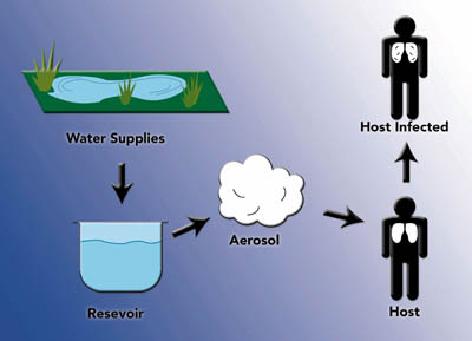 Matthew Palmer [one of the BU students on the MSc Public Health programme within HSC] has just published part of his dissertation as a letter to the editor of the European Journal of Epidemiology. Matthew is reporting and confirming, for the first time, the identification of the microorganism (Legionella pneumophila) in water obtained from the windscreen washer fluid of a car without added screenwash.
Matthew Palmer [one of the BU students on the MSc Public Health programme within HSC] has just published part of his dissertation as a letter to the editor of the European Journal of Epidemiology. Matthew is reporting and confirming, for the first time, the identification of the microorganism (Legionella pneumophila) in water obtained from the windscreen washer fluid of a car without added screenwash.
Legionellosis or Legionnaires’ disease is a severe bacterial pneumonia caused by Legionella pneumophila acquired through droplet inhalation. Its public health significance lies primarily in the potential for large outbreaks of the disease such as the 1976 outbreak at an American Legionnaires’ conference in Philadelphia from which the disease derives its name. According to the Health Protection Agency there are, on average, 237 cases a year in England and Wales.
This is the first time that Legionella pneumophila has been identified in windscreen washer fluid and the first time that screenwash has been shown to be effective against its growth. With this in mind, we felt that Matthew should waste no time in getting this into the literature by starting publishing his findings. We envisage that there will be a fair amount of interest in Matthew’s discovery, especially within the public health world.
Matthew is currently working as a senior health protection practitioner at the Health Protection Agency and he has been doing his MSc degree at BU on part-time basis under the supervision of Professor Ahmed Khattab, Vanessa Heaslip and the MSc Public Health team.
You can access Matthew’s paper via this link: http://www.springerlink.com/content/u024qt22g77820t7/
Read more about Legionnaires’ Disease on the NHS website: http://www.nhs.uk/conditions/legionnaires-disease/Pages/Introduction.aspx
Prof Ahmed Khattab, HSC
Innovative post graduate research in the School of Tourism
Yesterday saw an opportunity for PhD students from the School of Tourism to update colleagues on the progress of their research through a day conference based on a series of interactive poster sessions. 18 students presented their work on a wide range of subjects (see below) and then submitted themselves to questioning and interrogation from the audience. This built on the presentations that student had done at the recent Post Graduate Tourism Conference at Exeter University and really highlighted the breadth and depth of research in this area within the University.
The Posters that were presented are listed below and some pictures of the day can be found on Dr Miguel Moital’s blog at, http://miguelmoital.blogspot.co.uk/
- Zornitza YOVCHEVA – Information system design of Smartphone augmented reality for tourism
- Ivana RIHOVA – Consumers as producers: customer-to-customer co-creation in the context of festival experiences
- Nicolas GREGORI Y RIBES- Technology and social media enabled service development and design
- Barbara NEUHOFER – Technology enhanced tourist experience
- John FOTIS – The impact of social media on consumer behaviour; focus on holiday travel
- Gayathri KANAGASAPATHY – The heritage experience, a visitor perspective: a comparative study of heritage destinations in Malaysia
- Gde Indr BHASKARA – The local community as a stakeholder group and its participation in UNESCO’s World Heritage Nomination process: Jatiluwih Rice Fields, Bali, Indonesia
- Emma KAVANAGH – A narrative enquiry into the experience of maltreatment in high performance sport
- Sean BEER – Human perceptions of the authenticity of food
- Andrew HARES – Tourist understanding of and engagement with the climate change impacts of holiday
- Julia HIBBERT – Tourism travel and identity
- Jan HUTCHINGS – ‘In the Swim‘ – an ethnography on Masters swimming
- Stephen CALVER – The influence of mass media on countryside leisure visit behaviour compared
- Gregory KAPUSCINSKI – Tourism, terrorism, political instability and the media
- Joanna HAWKES – ‘My Bones Won’t Break Me’: an auto-ethnographical exploration of premenopausal osteoporosis in a physically active female‘
- Pamela WATSON – Grab Your Fork’: a netnography of a foodie blog and its community
- Stacy WALL – Synergies in public health and tourism; an organisational ethnography
- Amanda WILDING – The diffusion and adoption of sport psychology by track and field coaches
Twitter for Research Academics

Sharing research with the world is becoming ever-more important with the new criteria in REF. When trying to reach large audiences, Twitter is a must-use tool – a shared (“retweeted”) message in Twitter reaches an average audience of over 1,000 people.
To help you share and develop your research using Twitter, BU is hosting workshops on how to use and make the most of the tool.
Even if you’ve never used Twitter before, attend one of these sessions to learn how to create your account with an enticing profile, compose engaging messages (“tweets”), interact with academics, businesses and organisations in your field and sow the seeds of impact for REF assessment using Twitter.
Wellcome Trust: People and Society Awards
The Wellcome Trust’s People and Society Awards are aimed at enabling the public to explore biomedical science – including its history, how it shapes culture and society and the implications that it has for ethics. The awards represent a significant commitment to public engagement in biomedical science and are open to a wider range of people, including academics and practitioners.
The People Awards, for up to and including £30,000, fund small to medium sized one-off projects. The next deadline is 27th July, 2012. The Society Awards, above £30,000, are intended to scale-up People Awards or provide funding for larger projects that seek to engage an audience across the UK. There is a deadline for a themed call (and this year it is Health in a Changing World) on 5th October, 2012.
Much more detail about the awards can be found on the Wellcome Trust’s website.
If you are considering making an application, please do contact Becca Edwards (redwards@bournemouth.ac.uk / 01202 961206) for further support.
Wellcome Trust call for Small Arts Awards
 Arts Awards support imaginative and experimental arts projects that investigate biomedical science.
Arts Awards support imaginative and experimental arts projects that investigate biomedical science.
The scheme aims to:
- stimulate interest, excitement and debate about biomedical science through the arts
- examine the social, cultural and ethical contexts of biomedical science
- encourage new ways of thinking
- promote high-quality interdisciplinary practice and collaborations between arts, science and education practice
- support formal and informal learning.
The scheme is open to a wide range of people, including artists, scientists, curators, film makers, writers, producers, directors, academics, science communicators, teachers, arts workers and education officers.
Your project must involve the creation of new artistic work and have biomedical scientific input into the process, either through a scientist taking on an advisory role or through direct collaboration. This expert may be from an ethics, science or history background, but must be an expert in the area of biomedical science you are investigating.
If your proposed project has an artistic dimension but does not involve the creation of new work, then it may be more appropriate to apply for a People/Society Award.
You can apply for funding at two levels:
Small Arts Awards (small to medium-sized projects – up to and including £30 000)
Funding can support the development of new project ideas, deliver small productions or workshops, investigate and experiment with new methods of engagement through the arts, or develop new collaborative relationships between artists and scientists.
Large Arts Awards (larger projects – above £30 000)
This funding can support full or part production costs for high-quality large arts projects that aim to have significant impact on the public’s engagement with biomedical science.
Projects that are not eligible for Arts Award support include health promotion, education or campaign projects, arts projects for therapeutic purposes, straight documentaries, work that is purely illustrative, and projects dealing with non-biomedical sciences.
You should refer to the application guidelines, Grant Conditions and evaluation guidelines before completing your application.
Complete a full application form, via the Trust’s eGrants online application system (select the ‘Small Arts Awards’ form in the ‘Full application’ drop-down menu), and submit it at any time before the deadline of 27th July 2012. Funding decisions will be made approximately three months after the relevant deadline.
The RKE Operations team can help you with your application.
Prof Alice Roberts: ‘Public engagement should be part of academic life’ – video
Today the Guardian have uploaded a video of Prof Alice Roberts (who is now University of Birmingham’s first Professor of Public Engagement in Science), talking about the need for scientists to ensure their research findings reach a far wider audience. You can find the video here. I think this provides strong commentary on the need for all researchers, regardless of their discipline, to ensure their research findings reach a far wider audience.
The video also highlights the concern that many researchers have, in that by getting involved with public engagement this is likely to have a negative impact on their careers. I know this is something that I personally have struggled with during my research career, but increasingly the opposite is the case with changing expectations of what should be the outcome of research. With major initiatives such as the RCUK’s Catalysts, public engagement as part of research activity is likely to be here to stay. BU is recognising this by providing addition support for public engagement activities via the Research Development Unit.
If you are interested in thinking about how your research can reach a wider audience, please do contact me on redwards@bournemouth.ac.uk or 01202 961206.
EPSRC Call for Feasibility Study Proposals: Through-life engineering services
 Summary
Summary
The EPSRC Centre for Innovative Manufacturing in Through-life Engineering Services is offering funding for feasibility studies in the field of through-life engineering services. Through-life Engineering Services are technical services that are necessary to guarantee required and predictable performance of a complex engineering system throughout its expected operational life with the optimum whole life cost. The feasibility studies should examine a subject area in the field, review activity in it, identify key challenges and research questions not currently being addressed and develop full proposals for funding by established routes. Awardees are expected to attract significant new industrial support and the subsequent major award will form a strategic part of the Centre activities. Awards are limited to £20,000 at 80% FEC and to a maximum duration of six months.
How to apply
Feasibility study applications should be submitted to Professor Rajkumar Roy, the National Centre Director (director@through-life-engineering-services.org), and copied to Andy Shaw, the National Centre Manager (manager@through-life-engineering-services.org).
Key dates
| Activity | Date |
|---|---|
| First Call Launched | 14 May 212 |
| Closing date for applications | 30 June 2012 |
| Evaluation of applications by the Centre Executive Committee | 13 July 2012 |
| Grants announced and feedback given by | 30 July 2012 |
| Expected start of the projects by | 15th August 2012 |
- Call for Feasibility Study Proposals – Call document (PDF 94KB)
Full call document including background, eligibility, how to apply and guidance.
EPSRC call ‘Design for Wellbeing: Ageing and Mobility in the Built Environment’
Summary
EPSRC is leading a call with the Economic and Social Research Council (ESRC) and the Arts and Humanities Research Council (AHRC) and invites proposals from interdisciplinary consortia for evidence led research into ageing and mobility in the built environment. This call is being run under the auspices of the Lifelong Health and Wellbeing (LLHW) cross-council ageing research programme which supports research addressing factors throughout life that influence health and wellbeing in older age.

This call is seeking to create a step change in interdisciplinary engineering, social science and design research for wellbeing in the built environment. There is up to £7M available (EPSRC up to £4M, ESRC up to £2M and AHRC up to £1M) to support a maximum of five large multi-disciplinary projects of up to three years duration.
Prospective applicants will need to complete an Expression of Interest form by 12:00 on Monday 10 September 2012.
The expressions of interest will be assessed by an expert short listing panel in September 2012 and those aligned appropriately with the assessment criteria will be invited to submit full proposals. The deadline for submitting an Expression of Interest is 12:00 on 10 September 2012. Those invited to submit a full proposal will be notified by the end of September 2012. The deadline for the submission of full proposals will be 28 November 2012, and will be peer-reviewed in March 2013 with the expectation that funding decisions will be made by the end of March 2013.
Timetable
There are two stages in the assessment process. This call invites Expressions of Interest (EoIs) which will be assessed by a shortlisting panel in September 2012. Shortlisted applicants will then be invited to submit full proposals.
| Activity | Date/Time |
|---|---|
| Call for Expressions of Interest | May 2012 |
| Call for Expressions of Interest submission deadline | 12:00 noon on 10 September 2012 |
| Applicants informed of outcome and full proposals invited | 26 September 2012 |
| Deadline for submission of full proposals | 16:00 on 28 November 2012 |
| Prioritisation panel | March 2013 |
Full call document: Design for Wellbeing: Ageing and Mobility in the Built Environment (PDF 100KB)
Book Citation Index for WoK – 3 month Trial – take part now!
 BU have just enabled a trial of Web of Knowledge Book Citation Index. It will last for 3 months, until 6th August.
BU have just enabled a trial of Web of Knowledge Book Citation Index. It will last for 3 months, until 6th August.
The Book Citation Index allows you to search for books and book chapters using all of the fields and features available in Web of Science. They have added two new indexes to Web of Science:
- Book Citation Index– Science (BKCI-S) — 2005-present
- Book Citation Index– Social Sciences & Humanities (BKCI-SSH) — 2005-present
Key features available when searching for books and book chapters include:
- View citation counts captured for books and book chapters for Citing Articles, Cited References, Related Records, and Shared Records for all available years.
- View citation counts provided to book sources from journal articles and conference-proceedings that cite books and book chapters and vice-versa.
Whilst we don’t currently have a subscription, we are interested in seeing what the coverage is like for BU academics, particularly in the humanities and social sciences that have traditionally experienced less comprehensive coverage by citation databases, although science books are also covered. Please note, not all published books appear here, with concentration on purely research books rather than text books or more populist titles.
There are 143 items listed as having BU Authors:
http://www.bournemouth.ac.uk/library/resources/w.html
Please have a look at what WoK can offer and provide feedback to Emma Crowley: e-mail: ecrowley@bournemouth.ac.uk web site: Library and Learning Support
The pursuit of mud
I am fortunate to have been let out of the office and into the sunshine this week to pursue a small piece of data collection I have wanted to do for ages as part of my NERC grant. It involves standing knee deep in mud!
I have been working for a while on the control of substrate on footprint typology and believe firmly in working in natural depositional environments to do so when I can. In recent years the team has done a lot of work on various beaches looking at the control of moisture content and walking speed on print form and linking this to plantar pressure data taken in the lab. We have also done some really cool work in Namibia on footprint morphology and substrate properties, which one of my colleagues recently reported at the Annual American Physical Anthropology conference in Portland. But testing the limits of print preservation needs some real mud!
Plotting BU’s research strategy and REF submission is no match in terms of fun when one could be wading bare foot and knee deep in mud, although the two feel quite similar at times! This week I am collecting data from a range of estuarine muds – different grains sizes, moisture contents to explore the limits of footprint formation and typological variance. Visiting different sites we make a trail of prints and then photograph each print, perhaps 30 or 40 times, from different angles and perspectives to provide the data to build three dimensional models using photogrammetry. We will then combine these models to create an average print and compare this to the sedimentological data we are also collecting at each site. In the past I have used an optical laser scanner to analyse foot prints, but no one in their right mind would let me loose with one of those in this mud! So it’s a week of mud for me and I will see you all back in the office next week.
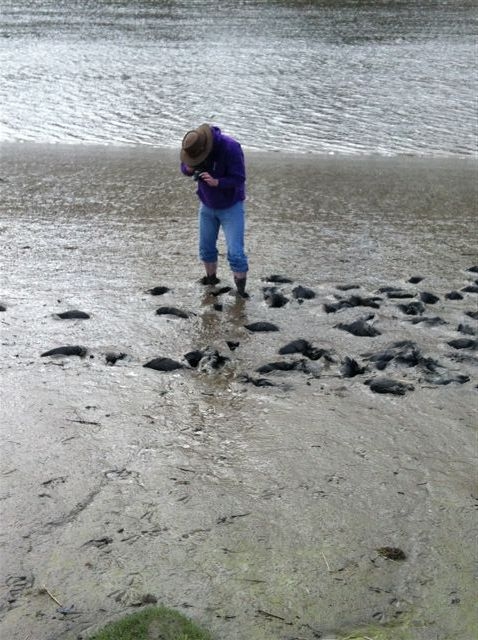
Got colleagues in China? This new education cooperation agreement could really work in your favour…
 A new education component of the EU-China “people-to-people dialogue” agreement was recently announced . The agreement aims to make China more attractive for European students by setting up scholarship programmes, increase the mutual recognition of diplomas, and set up joint schools such as the China-Europe Institute of Clean and Renewable Energy. The European Commission will also encourage Chinese researchers to take part in the Marie Curie Programme for researcher exchange.
A new education component of the EU-China “people-to-people dialogue” agreement was recently announced . The agreement aims to make China more attractive for European students by setting up scholarship programmes, increase the mutual recognition of diplomas, and set up joint schools such as the China-Europe Institute of Clean and Renewable Energy. The European Commission will also encourage Chinese researchers to take part in the Marie Curie Programme for researcher exchange.
Opportunities for existing ESRC Students
 Overseas institutional visits
Overseas institutional visits
All full-time ESRC studentship holders are eligible to apply for financial support for overseas institutional visits (OIVs) within their studentship period, to visit overseas universities or esteemed research organisations. This additional funding is intended to provide applicants with the opportunity to:
- establish research networks
- disseminate early research findings
- participate in seminars and other academic activities that are directly relevant to their research
- undertake specialist research training that is not available within the UK.
How to apply
You should submit completed applications to your research organisation (RO) nominated contact who will check the form before forwarding it to ESRC. You should note that applications are sent to ESRC in batches by 16.00 on the last working day of the month. If you miss a batch deadline this will delay the processing of your application.
Applicants must allow at least three months between the batch deadline for the month in which they apply and commencing the visit (eg if your application was received by ESRC on 30 January, the earliest you would be able to commence your visit would be 1 May).
We will aim to process and send applications to assessors within five working days. We will normally communicate funding decisions to nominated RO contacts within two months of the batch deadline, although this may take longer at certain times of the year.
You should read the scheme guidance notes before completing the application form:
All successful overseas applicants are required to submit an end of award report within two weeks of the end of the overseas institutional visit. Students undertaking more than one visit should submit a report on completion of each separate visit.
Further information
If you have any queries about the scheme please contact:
- Julie Dunsby
Telephone: 01793 413011
Email: julie.dunsby@esrc.ac.uk - Sarah Peart
Telephone 01793 413145
Email: sarah.peart@esrc.ac.uk
Leverhulme Trust Research Project Grants – Outlines welcomed
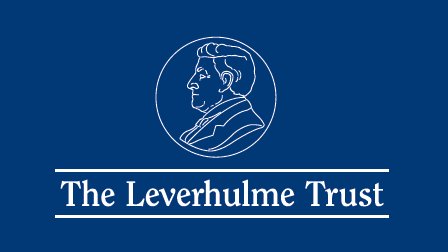 The aim of these awards is to provide financial support for innovative and original research projects of high quality and potential, the choice of theme and the design of the research lying entirely with the applicant (the Principal Investigator). The grants provide support for the salaries of research staff engaged on the project, plus associated costs directly related to the research proposed.
The aim of these awards is to provide financial support for innovative and original research projects of high quality and potential, the choice of theme and the design of the research lying entirely with the applicant (the Principal Investigator). The grants provide support for the salaries of research staff engaged on the project, plus associated costs directly related to the research proposed.
Proposals are favoured which:
- reflect the personal vision of the applicant;
- demonstrate compelling competence in the research design;
- surmount traditional disciplinary academic boundaries;
- involve a degree of challenge and evidence of the applicant’s ability to assess risk.
Value and Duration
The great majority of awards involve a spend of up to £250,000 over a duration of two to three years. If compelling evidence is provided, awards may be made for sums between £250,000 and £500,000 for research over a period of up to five years. The assessment procedures for these large grants are especially stringent, and can involve site visits and discussions with applicants.
Topics
Applications for research on any topic within the entire array of academic disciplines are eligible for support. However, an exception is made for areas of research supported by specialist funding agencies and, in particular, for medicine. In such cases, applicants should consider an application to these alternative funding bodies as being more appropriate. Specific attention is paid to the reasons given by applicants in justifying their choice of the Trust as the most appropriate agency for the support of their project.
Please read the following before submitting an application.
Contact
If your query has not been answered in the links please contact Matt Dillnutt regarding Outline Applications (020 7042 9873); or Nicola Thorp regarding Detailed Applications (020 7042 9872).
The RKE Operations team can help you with your application.
There are no closing dates for Outline Applications. Deadlines for Invited full applications are 21 March, 1 September, 1 December annually
Register now for BRIAN Demonstrations – the new Publication Management System
The new publication management system BRIAN (Bournemouth Research, Information and Networking) will go live on 22 June 2012. BRIAN will provide a facility for academics to quickly and easily update their research activity via a single point of data entry which will enable research information to be used in multiple places, including BURO and the BU Staff Profile web pages, without the need to duplicate or enter additional data. Academic staff will no longer add  records direct to BURO, but via BRIAN.
records direct to BURO, but via BRIAN.
BRIAN will allow you to have ownership of your staff profile web pages so these are easily kept up to date, allowing you to promote yourself for potential research collaborations, research grants and enterprise opportunities, research assessment exercises, etc. It will also provide a search function for staff to find out about potential collaborative opportunities with colleagues from across BU. BRIAN will enable BU to meet research assessment requirements by improving the administrative efficiency and data accuracy.
Demonstrations of the new system have been arranged and each will run for one hour and will also allow time for you to interact with the new system. These are being held on the following dates:
24th May – 1pm – to be held in CG21, Christchurch House
29th May – 10am – to be held in CG21, Christchurch House
29th May – 2pm – to be held in CG21, Christchurch House
6th June – 10am – to be held in P231-5, Poole House
6th June – 2pm – to be held in P231-5, Poole House
It is highly recommended that all academics attend a demonstration of BRIAN as the system will be extremely important to your research profile.
To register for a session, please select your preferred date and a second choice (as demand will be high) and email this to Joan Bonnici at: ovctemp@bournemouth.ac.uk by 22nd May 2012.
ESRC Training Bursaries
Each year ESRC provides 50 bursaries for up to £1,000 each to enable staff in the UK social science community engaged in research, teaching research methods or supervising research to update their research skills. Those training courses must not be provided at the own institution. Contract researchers working in HEIs are also eligible for the bursaries.
I have obtained a number of bursaries from this source. It is not a complicated process to apply. Quite simple and straightforward. Search for suitable courses for your own need on NCRM Training and Events website. Then go to ESRC Training Bursaries website to fill in a short form.
Good luck.











 Bridging the Digital Divide: How Older Adults Navigate a Digital Society
Bridging the Digital Divide: How Older Adults Navigate a Digital Society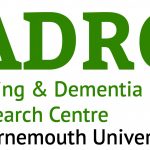 ADRC launches new DEALTS2 train-the-trainer video series
ADRC launches new DEALTS2 train-the-trainer video series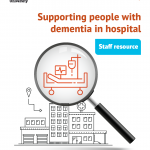 Insight Dementia educational resource: now available!
Insight Dementia educational resource: now available! NIHR Global Health Research Academy 2025
NIHR Global Health Research Academy 2025 Horizon Europe 2025 Work Programme pre-Published
Horizon Europe 2025 Work Programme pre-Published MSCA Postdoctoral Fellowships 2025
MSCA Postdoctoral Fellowships 2025 Update on UKRO services
Update on UKRO services European research project exploring use of ‘virtual twins’ to better manage metabolic associated fatty liver disease
European research project exploring use of ‘virtual twins’ to better manage metabolic associated fatty liver disease